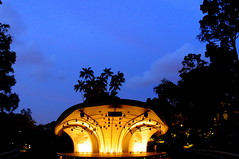Opera In The Park On Sunny Weekends and Successful Cities
One year on and Singapore is hosting the inaugural World Cities Summit 2008. Unfortunately, it has also been tossed out of Monocle's top 20 listing of the world's most liveable cities.
We were lounging on the lawn at the Singapore Botanical Gardens. On the picnic mat: a little brown basket, good Ford Farm oakwood smoked cheese, a rather squished baguette, honey-baked gammon ham, sweet beetroot, sweet strawberries, a pitcher of iced homemade strawberry lemonade for the hot afternoon and a frisbee. Later, a boy would eat strawberries voraciously then put a foot on the cheese.
And we were discussing countries of residence. I'd previously been pegged as one of the country folk, given to Land Rovers and the great outdoors, long woodland hikes and fresh air, composting and matted hair. Be that as it may, I'd said, still I will need good access to an urban centre, a city, a metropolis. For the music, I may have added, but the Singapore Lyric Opera Children's Choir began to sing.
(What is there to say about Darrell Ang and the inaugural Opera In The Park? Nothing about acoustics obviously. Nothing about the grandoise costumes that would have wilted in the heat. There was no space for a deus ex machina. And there was time only for scraps, "operatic favourites". Still, great to get out and lie about in the balmy weather and listen to Mozart and Mascagni. But as the afternoon wore on, more and more people were pressed around our picnic mat. Perhaps, I'd suggested, we can bring durians next time so everyone will give us a wide berth. Right on cue, the unmistakable scent of durian wafted past. Dog poo! complained the ang moh next door but did not budge.)
Florida refutes Thomas L. Friedman's assertion that the world is flat; the world is spiky and the peaks are the cities. Tyler Brûlé totally had his finger on the pulse with the macro-vision Monocle. Micro-vision Wallpaper*-ing had become so yesterday.
And the folk indeveloping emerging economies know this. Replacing economists and technocrats in the political power stables are urban planners and city visionaries, shaven-headed and goateed, touting creative urban renewal schemes in Macs and Moleskines. Chatting and brainstorming offline* with some of them over the last year has been interesting.
 And it is the economies emerging from decades of communism/socialism that promise the most fun. Imagine SimCity divinity, a pliant population, vast untapped resources and foreign money lining up eagerly at your door. What could stop you from building a city (or two, or ten) other planners can only dream of, straitjacketed as they are by local/national politics, interest groups, exhausted resources and saturated markets?
And it is the economies emerging from decades of communism/socialism that promise the most fun. Imagine SimCity divinity, a pliant population, vast untapped resources and foreign money lining up eagerly at your door. What could stop you from building a city (or two, or ten) other planners can only dream of, straitjacketed as they are by local/national politics, interest groups, exhausted resources and saturated markets?
And what, in the first place, characterises a successful city? Even if one assumes, simplistically, economic growth as the most important characteristic of a good city, economic growth, according to Florida, cannot be divorced from a vibrant urban environment: "regional economic growth is powered by creative people, who prefer places that are diverse, tolerant and open to new ideas".
The perfect city, the place a talented global nomad would want to stash his Yohji Yamamoto and build his life and career in, is less about cleanliness, safety, healthcare and good schools for the kids; it isn't about iconic buildings (see also Roger Scruton, Cities For Living in City Journal), new sports stadiums or pedestrian malls; it is about buzz and energy and a thriving counterculture. "The same kind of community that allows a music scene, an art scene, a gay scene to develop also allows entrepreneurs to come into those communities to mobilise resources," Florida says. As cities come under increasing pressure to compete for global talent, it is not surprising that the governments of certain cities have seen it necessary to make ambiguous statements about emerging tolerance.
(Well, that just takes care of the humans. But what about the environment? The rise of deliberately developed sustainable eco-cities suggests that the world has embraced stewardship of the environment as necessary to entry to the clique of hip and cool kids.)
But before governments and city councils join the curated graffiti fad and panhandle for the pink dollar, it's worth querying the accuracy of Florida's theories about the relationship between urban economic growth and "the creative class". Does "the creative class" actually contribute to economic growth (see Steven Malanga, The Curse of the Creative Class in City Journal)? And if so, is it actually urban density and diversity that hothouses collaborations and creativity (see Anya Kamenetz, The Laws of Urban Energy in Psychology Today)? And if it is, how can urban planners and city CEOs avoid the pitfalls of eg. urbanism myths: over-relying on high profile, "sexy" projects for urban regeneration; having an unhealthy fascination with unique, charismatic civic leaders; misapplying of other cities' approaches etc (see Five Innovation Myths Applied to Urbanism)?
 There is immense power in governing a group of people and planning their living space. And with great power, as the superhero sage advice goes, comes great responsibility. Urban places are such intricate and complex ecosystems. How can we avoid, in our best-intentioned enthusiasm, taking an existing city to bits and boinking ourselves on the head with the pieces?
There is immense power in governing a group of people and planning their living space. And with great power, as the superhero sage advice goes, comes great responsibility. Urban places are such intricate and complex ecosystems. How can we avoid, in our best-intentioned enthusiasm, taking an existing city to bits and boinking ourselves on the head with the pieces?
My money is on going back to the one who created the world in the first place. He alone as architect and designer of the universe should be able to give better advice than the world's most highly-paid (but inevitably ignorant) consultant. And this much at least is clear from the instruction manual on human beings: WARNING: sex outside a one man-one woman marriage not according to manufacturer's specification. Misuse will result in damage and death. (Leviticus 18:22; Leviticus 20:13; 1 Corinthians 6:9-10; 1 Timothy 1:10).
The "creative class" theory is probably due for a bit of an overhaul.
We were lounging on the lawn at the Singapore Botanical Gardens. On the picnic mat: a little brown basket, good Ford Farm oakwood smoked cheese, a rather squished baguette, honey-baked gammon ham, sweet beetroot, sweet strawberries, a pitcher of iced homemade strawberry lemonade for the hot afternoon and a frisbee. Later, a boy would eat strawberries voraciously then put a foot on the cheese.
And we were discussing countries of residence. I'd previously been pegged as one of the country folk, given to Land Rovers and the great outdoors, long woodland hikes and fresh air, composting and matted hair. Be that as it may, I'd said, still I will need good access to an urban centre, a city, a metropolis. For the music, I may have added, but the Singapore Lyric Opera Children's Choir began to sing.
(What is there to say about Darrell Ang and the inaugural Opera In The Park? Nothing about acoustics obviously. Nothing about the grandoise costumes that would have wilted in the heat. There was no space for a deus ex machina. And there was time only for scraps, "operatic favourites". Still, great to get out and lie about in the balmy weather and listen to Mozart and Mascagni. But as the afternoon wore on, more and more people were pressed around our picnic mat. Perhaps, I'd suggested, we can bring durians next time so everyone will give us a wide berth. Right on cue, the unmistakable scent of durian wafted past. Dog poo! complained the ang moh next door but did not budge.)
[The] clustering [of musicians in cities] is puzzling because music-making requires little, if anything, in the way of physical input (such as iron ore or coal) to succeed, and they don't generate economies of scale.We are far removed from the days of 17th century Vienna, and even 1990s' Madchester. Still, people go to the city to test their ideas, perform, learn, sell, discuss, share. And they do this physically and digitally, in and around cities like Goteborg and soon maybe Shanghai. Richard Florida suggests that the congregation of musicians in cities demonstrates that the concept of "place", especially in developed countries, has leapfrogged over vocation in the Abraham Maslow's pyramid of skilled, educated people in their twenties and thirties. More people have the means to be more internationally mobile than ever before in human history. And wherever they go, they bring to a city large amounts of human capital, which helps increase entrepreneurship and deepen the area's talent pool. The highest levels of economic growth and development is concentrating in cities, and certain cities are experiencing much faster economic prosperity expansion than others. The same migration brings people who stimulate development by moving to neglected neighborhoods and making long-term investments in schools, homes and businesses.
Because musical and artistic endeavours require little more than small groups to make their final products, you would think that musicians should be able to live anywhere they want.
Music scenes have every reason to "fly apart" and spread out geographically, especially in this age of the Internet and social media. But they don't. Instead, they concentrate and cluster in specific cities and regions... (The Globe and Mail, Why making the scene makes good cents for the rest of us)
Florida refutes Thomas L. Friedman's assertion that the world is flat; the world is spiky and the peaks are the cities. Tyler Brûlé totally had his finger on the pulse with the macro-vision Monocle. Micro-vision Wallpaper*-ing had become so yesterday.
And the folk in
 And it is the economies emerging from decades of communism/socialism that promise the most fun. Imagine SimCity divinity, a pliant population, vast untapped resources and foreign money lining up eagerly at your door. What could stop you from building a city (or two, or ten) other planners can only dream of, straitjacketed as they are by local/national politics, interest groups, exhausted resources and saturated markets?
And it is the economies emerging from decades of communism/socialism that promise the most fun. Imagine SimCity divinity, a pliant population, vast untapped resources and foreign money lining up eagerly at your door. What could stop you from building a city (or two, or ten) other planners can only dream of, straitjacketed as they are by local/national politics, interest groups, exhausted resources and saturated markets?And what, in the first place, characterises a successful city? Even if one assumes, simplistically, economic growth as the most important characteristic of a good city, economic growth, according to Florida, cannot be divorced from a vibrant urban environment: "regional economic growth is powered by creative people, who prefer places that are diverse, tolerant and open to new ideas".
The perfect city, the place a talented global nomad would want to stash his Yohji Yamamoto and build his life and career in, is less about cleanliness, safety, healthcare and good schools for the kids; it isn't about iconic buildings (see also Roger Scruton, Cities For Living in City Journal), new sports stadiums or pedestrian malls; it is about buzz and energy and a thriving counterculture. "The same kind of community that allows a music scene, an art scene, a gay scene to develop also allows entrepreneurs to come into those communities to mobilise resources," Florida says. As cities come under increasing pressure to compete for global talent, it is not surprising that the governments of certain cities have seen it necessary to make ambiguous statements about emerging tolerance.
(Well, that just takes care of the humans. But what about the environment? The rise of deliberately developed sustainable eco-cities suggests that the world has embraced stewardship of the environment as necessary to entry to the clique of hip and cool kids.)
But before governments and city councils join the curated graffiti fad and panhandle for the pink dollar, it's worth querying the accuracy of Florida's theories about the relationship between urban economic growth and "the creative class". Does "the creative class" actually contribute to economic growth (see Steven Malanga, The Curse of the Creative Class in City Journal)? And if so, is it actually urban density and diversity that hothouses collaborations and creativity (see Anya Kamenetz, The Laws of Urban Energy in Psychology Today)? And if it is, how can urban planners and city CEOs avoid the pitfalls of eg. urbanism myths: over-relying on high profile, "sexy" projects for urban regeneration; having an unhealthy fascination with unique, charismatic civic leaders; misapplying of other cities' approaches etc (see Five Innovation Myths Applied to Urbanism)?
 There is immense power in governing a group of people and planning their living space. And with great power, as the superhero sage advice goes, comes great responsibility. Urban places are such intricate and complex ecosystems. How can we avoid, in our best-intentioned enthusiasm, taking an existing city to bits and boinking ourselves on the head with the pieces?
There is immense power in governing a group of people and planning their living space. And with great power, as the superhero sage advice goes, comes great responsibility. Urban places are such intricate and complex ecosystems. How can we avoid, in our best-intentioned enthusiasm, taking an existing city to bits and boinking ourselves on the head with the pieces?My money is on going back to the one who created the world in the first place. He alone as architect and designer of the universe should be able to give better advice than the world's most highly-paid (but inevitably ignorant) consultant. And this much at least is clear from the instruction manual on human beings: WARNING: sex outside a one man-one woman marriage not according to manufacturer's specification. Misuse will result in damage and death. (Leviticus 18:22; Leviticus 20:13; 1 Corinthians 6:9-10; 1 Timothy 1:10).
The "creative class" theory is probably due for a bit of an overhaul.
For the succulent sweetness of sunshine, green grass, good food, good friends and a good God:
Edson Sunday, Lovely Sunday (Pelle Carlberg)
The Secret Life of Sofia Nanda Devi (myspace)
The Secret Life of Sofia Outside (myspace)
Starlet Sunshine (myspace)
Airliner Everything That's You
Acid House Kings London School of Economics (myspace)
Acid House Kings I Write Summer Songs For No Reason
Starlet When The Sun Falls On My Feet
Airiel Sugar Crystals (featuring Ulrich Schnauss) (myspace)
Sambassadeur Between The Lines (myspace)
Sambassadeur Kate
Brideshead Love Makes The Sun Shine Bright
Irene Little Things (That Tear Us Apart)
Red Sleeping Beauty Summer Tells Stories (myspace)
The Maccabees The Picnic Song
Oh No! Oh My! Walk In The Park (myspace)
Also, though not on last.fm:
Dirty On Purpose Girls & Sunshine - download from SXSW 2006 (myspace)
Plants and Animals Feedback In The Field - watch youtube vid (myspace)
Cloud Cult Bobby's Spacesuit - hidden track. Watch youtube vid (myspace)
Weezer Island In the Sun - listen on youtube
Thank you Britpop, North American shoegaze, Swedish twee and Labrador Records.
*cf online: Airoots, All About Cities, BLDBLOG, Urbanology, Where and even, Antiplanner! :-)
Labels: Jubal's Legacy: Songs for Sunny Days, Sunny Days, Urbanity or Just Urbanism










1 Comments:
This comment has been removed by the author.
Post a Comment
Subscribe to Post Comments [Atom]
<< Home